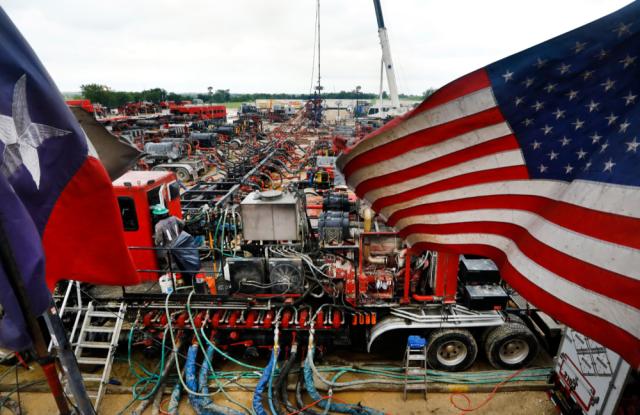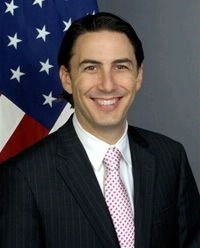
“I asked [shale executives], ‘Is there something I can do right now?’” Hochstein recently said. “The answer’s ‘no’. Some of them said, ‘Well, if you had sand or if you had labor fixes.’” (Source: Hart Energy)
Amos Hochstein, the Biden administration’s special envoy and coordinator for international energy affairs, wasn’t pleased with “disingenuous” shale executives blaming the federal government for the slow rise in U.S. production, when Financial Times spoke with him in Houston.

“If there’s a bottleneck it is on Wall Street. They should call their financiers and tell them there’s a war going on. The American public is paying the price,” Hochstein told Financial Times.
“I asked [shale executives], ‘Is there something I can do right now?’” he said. “The answer’s ‘no’. Some of them said, ‘Well, if you had sand or if you had labor fixes.’”
He also talked sanctions and U.S.-Saudi relations, which remain rocky. Here’s more from the conversation, lightly edited for concision:
1. On the White House changing tack to ban Russian oil and gas:
“When we began these sanctions . . . we wanted to make sure that the impact was felt on Putin and Russia, and to mitigate the possible impact on the United States, the American public and our allies. Clearly the escalation of the war, the barbarity of the military attacks by Putin on innocent civilians throughout Ukraine has caused us to escalate the sanctions.”
2. Are secondary sanctions—an effort to impose a full embargo on Russian oil—next?
“Our intention is to continue to tell Vladimir Putin, the elites around him, people who run industries and businesses and the Russian people that our sanctions will continue to escalate. And if they continue to pound the cities of Ukraine, our reactions will continue to escalate, and there will be a price to pay. We’ll do it with two things in mind. One, making them as unilateral as possible, and two that they’re designed to punish Putin and Russia more than they affect us . . . We will have a price to pay. This will have a cost.”
3. More oil releases from strategic stocks are very much on the table.
“If necessary we will do additional releases and do so with the international community.”
The U.S. has announced two strategic stock releases in recent months—an already unprecedented step. That more may follow shows the depth of the administration’s anxiety about oil and petrol prices.
4. On the U.S.-Saudi relationship:
Hochstein had no comment on reports that Saudi crown prince Mohammed bin Salman refused to take a phone call from Biden. But he said recent discussions had been “productive.”
“This is not an oil-based relationship,” he said. “There are some differences between us that we need to work through.”
“This is complicated set of circumstances that needs to be managed very very carefully,” he said, referring to Saudi Arabia’s OPEC+ oil alliance with Russia.
Hochstein praised Saudi Arabia for voting on the “side of the angels” in a recent UN vote on Russia. (The UAE abstained.) Referring to reports of further discord, he said: “The president spoke to the king. Recently, Brett McGurk [Biden’s Middle East co-ordinator on the National Security Council] and I were in Saudi Arabia just a couple weeks ago . . . Taking those developments as a negative sign is to take something that is moving in the right direction and try to force a wrong direction on it.”
So why haven’t they increased oil production in the face of a potential price shock?
“You’ll have to talk to them about that.”
This article is an excerpt of Energy Source, a twice-weekly energy newsletter from the Financial Times.
Recommended Reading
TGS Commences Multiclient 3D Seismic Project Offshore Malaysia
2024-04-03 - TGS said the Ramform Sovereign survey vessel was dispatched to the Penyu Basin in March.
Subsea Tieback Round-Up, 2026 and Beyond
2024-02-13 - The second in a two-part series, this report on subsea tiebacks looks at some of the projects around the world scheduled to come online in 2026 or later.
Going with the Flow: Universities, Operators Team on Flow Assurance Research
2024-03-05 - From Icy Waterfloods to Gas Lift Slugs, operators and researchers at Texas Tech University and the Colorado School of Mines are finding ways to optimize flow assurance, reduce costs and improve wells.
AI Poised to Break Out of its Oilfield Niche
2024-04-11 - At the AI in Oil & Gas Conference in Houston, experts talked up the benefits artificial intelligence can provide to the downstream, midstream and upstream sectors, while assuring the audience humans will still run the show.
2023-2025 Subsea Tieback Round-Up
2024-02-06 - Here's a look at subsea tieback projects across the globe. The first in a two-part series, this report highlights some of the subsea tiebacks scheduled to be online by 2025.





